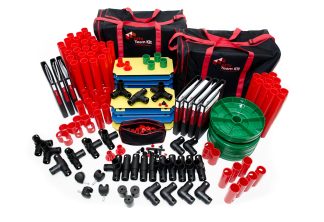Is it possible to develop team skills in just one hour?
This case study uses the example of a lesson given at Boston Spa School in Leeds.
In just one hour, can attitudes and behaviours change?
Aim: The aim of the lesson was to produce a video of groups learning how to recognise and make greater use of their potential.
The Plan: Run two separate sessions, both involving students aged 11 – 16 as well as staff. The students were a complete cross section ability and the experience of the staff was equally varied.
+ Students to work in approximate age groups and the staff to work together for most of the activities but to run one activity with completely mixed groupings.
+ Use tasks focussed on team working, with none demanding or benefiting from pre knowledge or skills.
+ Use a variety of methods to develop the learning:
a) facilitator-led discussion aimed at helping everyone recognise the value of the learning process, getting everyone involved, identifying areas for personal improvement without open personal critique
b) small group discussion to personalise the learning and develop common understanding of areas for and means of improvement
c) tick-box worksheets to focus attention on specific areas of learning.
What happened
“I was delighted by everyone’s level of engagement in both the tasks and the learning review processes. There were clear differences in the approaches taken by the different age groupings: the 11-12 year olds dived in with hands everywhere from the very beginning, the 13 – 14 year olds appeared more inhibited at first but once they’d realised success demanded involvement they became energised, and the 15 – 16 year olds demonstrated an ability to discuss the problems whilst testing out solutions. Meanwhile the staff got stuck and learned a lot the hard way!
Each of the groupings had similar levels of success with task completion, an indicator that although each of the groups demonstrated different strengths and weaknesses they all had significant potential to learn.
The reviews followed a similar pattern to the activities with the middle age group being cautious initially but after a few minutes everyone had contributed to the first review (led discussion). The tick-box questionnaire seemed to be well received by everyone, stimulating discussion in all of the groups.”
Martin Thompson, MTa Learning
The Learning: Levels of personal confidence and attitudes towards each other (and in some cases themselves) changed visibly, e.g. greater respect for others’ contributions.
Everyone recognised clear beneficial changes in their personal behaviour and the behaviour of others during the sessions.
Examples included:
+ Taking time to think
+Listening to others
+ Sharing ideas
+ Asking questions
+ Trying out different ways of doing things.
+ Developing an ‘I can’ attitude
+ Understanding more about what success means personally
+ Respecting their own and each other’s ideas and views
+ Valuing thought
+ Improving communication and problem solving skills
+ Everyone (students and staff) could see how the learning they achieved was relevant to life inside and outside school.
“I was delighted to see students from a range of backgrounds, with a mix of abilities working together. All in all it was an inspirational session for me: the students and the staff were great!”
The session was mentioned on the headmaster’s blog too – see www.bostonspa.leeds.sch.uk/week-ending-2nd-december-2011

